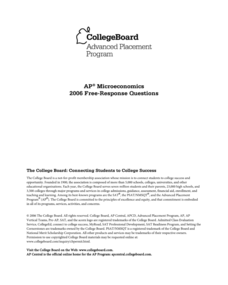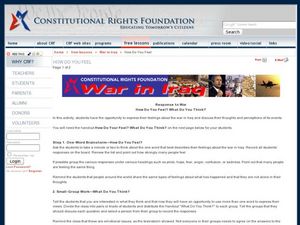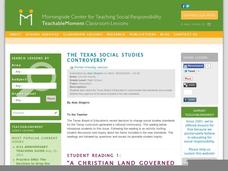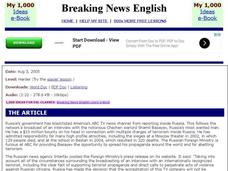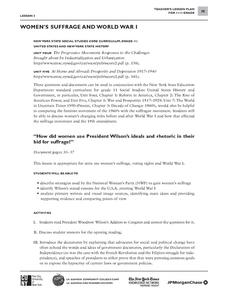College Board
2016 AP® European History Free-Response Questions
Why was the Scientific Revolution so significant? What led to Dutch prosperity during the 1600s? To what extent have employment patterns changed in France in the last 100 years? Young historians consider these questions and get solid...
College Board
2006 AP® Microeconomics Free-Response Questions
Communities often experience a tug-of-war between a desire for open space and a need for development. How can governmental policy affect each side of the issue? Scholars consider the question, along with queries on pricing and...
Echoes & Reflections
The "Final Solution"
Nazi policies shifted from deportation and imprisonment to extermination of the Jewish people in death camps in the "Final Solution." Learners examine photos of artifacts, read poetry written by survivors, analyze testimony from...
Great Books Foundation
I Shall Not Beg for My Rights
An excerpt from Henry MacNeal Turner's address to the Georgia legislature provides class members with an opportunity to develop their literary analysis skills. Prompted by the provided factual, evaluative, and interpretive questions,...
Curated OER
Fact-Based, Open-Ended, and Follow-Up Questions Worksheet
In this classroom applications of fieldwork basics worksheet, middle schoolers label 5 questions according to the type each one is and create 5 of their own fact-based and open-ended questions that may be used for interviewing purposes.
Echoes & Reflections
Perpetrators, Collaborators, and Bystanders
After the Holocaust, the world grappled with how to bring justice to the Nazis. But what to do with the thousands—if not millions—who allowed it to happen? Young historians consider the issues of guilt, collaboration, and responsibility...
Echoes & Reflections
Contemporary Antisemitism
Despite the recognized atrocities of the Holocaust, anti-semitism continues. The 11th and final installment of the Teaching the Holocaust series explores the long-term effects of the Holocaust on modern anti-semitism, asking pupils to...
Curated OER
Response to War: How Do You Feel? What Do You Think?
The class discusses how they feel about war. They brainstorm emotions that teens have toward the war in Iraq, and then discuss their opinions of the war in small groups. The discussion is then opened up to the entire class. What do you...
EngageNY
Mid-Unit 1 Assessment: Human Rights Vocabulary and Common Prefixes
Here is a mid-unit assessment for a group of lessons studying the Universal Declaration of Human Rights (UDHR). The first half of this instructional activity calls for several forms of review. Your class will review the content of the...
Curated OER
Colonial Regions of America 1689 - 1754 Worksheet
In this Colonial America worksheet, students color and label a map of the 13 colonies. They complete three more maps on which they label the major cities and waterways in New England, the Middle, and the Southern colonies. They answer an...
Curated OER
The Texas Social Studies Controversy
Examine the Texas social studies curriculum controversy with your class. Using a current events lesson, learners read the article "A Christian Land Governed by Christian Principles," respond to the discussion questions, and participate...
Curated OER
Quiz 4A: Polite Questions and Typical Responses
In this polite questions worksheet, students read each of 8 situations. Students write a polite question and give a typical response for each one. Students use the words: can I, may I, can you, could you and would you.
Curated OER
3 Branches of Our Government
This straightforward fill-in-the-blank activity could be used for a variety of purposes. Young historians are given 10 sentences about the branches of government; they fill in the blanks with terminology that is related to the United...
Curated OER
Breaking News English: TV News about Russia
In this TV News about Russia worksheet, students read the article, answer true and false questions, complete synonym matching, complete phrase matching, complete a gap fill, answer short answer questions, answer discussion questions,...
Curated OER
Student Opinion: How Should Schools Address Bullying?
Spark a disscussion about a current issue, bullying, in your classroom. This resource, published by The New York Times, provides a short article discussing a Anti-Bullying Bill of Rights passed into law in the state New Jersey followed...
State Bar of Texas
Grutter v. Bollinger
A university decides not to allow a qualified scholar to enter its institution based on skin and gender—but this case is about a white female? The 2003 Supreme Court case Grutter v. Bollinger lays the foundation for open discussion and...
City University of New York
Woman's Suffrage and World War I
How did women use President Wilson's ideals and rhetoric in their bid for suffrage? To answer this essential question, class groups analyze primary written documents and visual images.
Humanities Texas
Primary Source Worksheet: Thomas Jefferson, Confidential Message to Congress Concerning Western Exploration and Relations with the Indians
A confidential message written by Thomas Jefferson provides readers with an opportunity to practice their reading comprehension skills. The resource, part of a series, includes questions that require a close reading of the message and a...
Deliberating in a Democracy
National Service
Uncle Sam wants you to serve! Scholars investigate the role of mandatory national service in an open democracy. They research, watch a video, and hold a debate surrounding the issue of requiring one year of service to gain a better...
Curated OER
How did Geography Affect the Economy of the Colonies
Eighth graders examine the impact of geography on a region. In this geography lesson, 8th graders study the themes of geography. Students write an open response to a question.
Curated OER
The Federalist Debates: Balancing Power Between State and Federal Governments
Students explain the basic positions of the Federalists and the Anti-Federalists. They chart the differences and similarities between state and federal governments. They write a persuasive essay in response to an open-ended question.
Humanities Texas
Primary Source Worksheet: Franklin D. Roosevelt, First Inaugural Address
Young historians will learn not to fear primary source materials (or fear itself, for that matter) thanks to this resource that uses Franklin D. Roosevelt's March 4, 1933 Inaugural Address to model how to conduct a close reading of such...
US National Archives
Eastern Europe 1939-45 — Stalingrad
Acts of civilian courage in Great Britain—and in one case, the island of Malta—often receive the George Cross, instituted by King George VI at the beginning of World War II. After the valiant defense of Stalingrad by its inhabitants,...
Curated OER
NYC Muslim Community Center: Why there? Why not?
Students examine religious diversity issues. In this current events instructional activity, students read the provided articles "Sacred Ground or Bridging a Cultural Divide?" "Multiple Views of the Proposed Muslim Center," and "Protests,...

